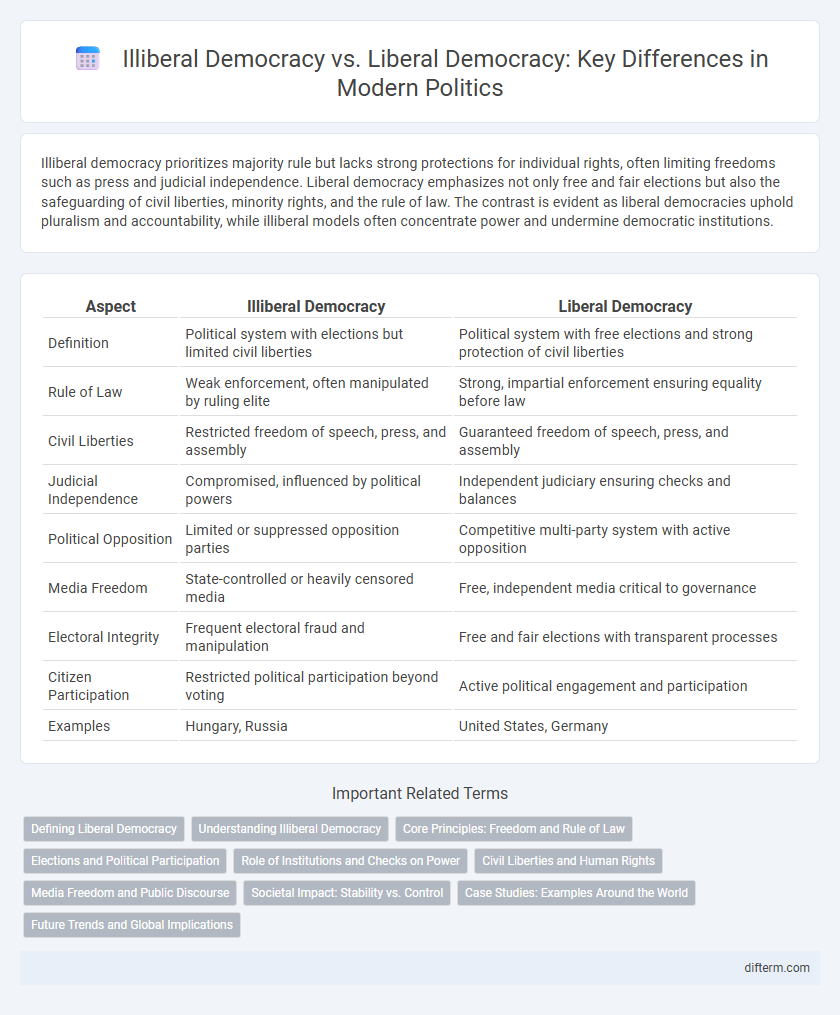Illiberal democracy prioritizes majority rule but lacks strong protections for individual rights, often limiting freedoms such as press and judicial independence. Liberal democracy emphasizes not only free and fair elections but also the safeguarding of civil liberties, minority rights, and the rule of law. The contrast is evident as liberal democracies uphold pluralism and accountability, while illiberal models often concentrate power and undermine democratic institutions.
Table of Comparison
| Aspect | Illiberal Democracy | Liberal Democracy |
|---|---|---|
| Definition | Political system with elections but limited civil liberties | Political system with free elections and strong protection of civil liberties |
| Rule of Law | Weak enforcement, often manipulated by ruling elite | Strong, impartial enforcement ensuring equality before law |
| Civil Liberties | Restricted freedom of speech, press, and assembly | Guaranteed freedom of speech, press, and assembly |
| Judicial Independence | Compromised, influenced by political powers | Independent judiciary ensuring checks and balances |
| Political Opposition | Limited or suppressed opposition parties | Competitive multi-party system with active opposition |
| Media Freedom | State-controlled or heavily censored media | Free, independent media critical to governance |
| Electoral Integrity | Frequent electoral fraud and manipulation | Free and fair elections with transparent processes |
| Citizen Participation | Restricted political participation beyond voting | Active political engagement and participation |
| Examples | Hungary, Russia | United States, Germany |
Defining Liberal Democracy
Liberal democracy is defined by its emphasis on individual rights, rule of law, and the separation of powers to ensure government accountability and protect minorities. Unlike illiberal democracies, liberal democracies guarantee free and fair elections, open civil society, and an independent judiciary. The protection of civil liberties such as freedom of speech, press, and assembly is a core principle distinguishing liberal democracy from authoritarian or illiberal regimes.
Understanding Illiberal Democracy
Illiberal democracy prioritizes majority rule while limiting civil liberties such as freedom of speech, press, and political opposition, often resulting in weakened checks and balances. Unlike liberal democracy, where constitutional protections safeguard individual rights and promote political pluralism, illiberal regimes typically concentrate power and restrict independent institutions. Understanding illiberal democracy requires recognizing its emphasis on electoral processes without guaranteeing fundamental democratic freedoms or the rule of law.
Core Principles: Freedom and Rule of Law
Liberal democracy is fundamentally characterized by the protection of individual freedoms and adherence to the rule of law, ensuring that laws apply equally to all citizens and government actions remain transparent and accountable. Illiberal democracy, while holding elections, often compromises these core principles by allowing restrictions on civil liberties, undermining judicial independence, and enabling government overreach. The tension between upholding freedom and maintaining rule of law defines the critical divide between these two systems, impacting the quality of governance and citizen rights.
Elections and Political Participation
Elections in liberal democracies are characterized by free, fair, and competitive processes ensuring broad political participation and protection of civil liberties. Illiberal democracies hold elections but often restrict genuine competition, limit political pluralism, and manipulate participation through state-controlled media or legal barriers. High voter turnout and open political engagement in liberal democracies contrast with controlled participation and reduced electoral fairness typical of illiberal regimes.
Role of Institutions and Checks on Power
Illiberal democracies often feature weakened institutions and limited checks on executive power, undermining transparency and accountability. In contrast, liberal democracies maintain strong, independent institutions and robust mechanisms such as judicial review and legislative oversight to constrain government authority. The effectiveness of these institutions directly influences the protection of civil liberties and the rule of law within a political system.
Civil Liberties and Human Rights
Illiberal democracies often curtail civil liberties and human rights by limiting freedom of speech, assembly, and press, undermining the rule of law and enabling authoritarian control. In contrast, liberal democracies uphold constitutional protections that guarantee individual freedoms, promote political pluralism, and enforce legal accountability to safeguard human rights. The strength of civil society institutions and independent judiciary in liberal democracies plays a crucial role in preventing abuses and preserving democratic governance.
Media Freedom and Public Discourse
Media freedom in liberal democracies is characterized by independent journalism, unrestricted access to diverse viewpoints, and protection against state censorship, fostering transparent public discourse. In illiberal democracies, media often faces government control, selective censorship, and propaganda, limiting the scope of public debate and undermining democratic accountability. This constriction of media freedom hampers informed citizen participation and weakens institutional checks and balances essential for democratic governance.
Societal Impact: Stability vs. Control
Illiberal democracies often emphasize societal stability through centralized control and limited political freedoms, resulting in constrained civic participation and restricted media. In contrast, liberal democracies promote political pluralism and individual rights, fostering social resilience and diverse public discourse despite occasional instability. The balance between stability and control in each system significantly shapes the societal landscape and citizens' engagement with governance.
Case Studies: Examples Around the World
Hungary and Poland exemplify illiberal democracies, where elected governments consolidate power by undermining judicial independence and restricting media freedom. In contrast, Canada and Germany represent liberal democracies that maintain strong institutional checks and balances, protect civil liberties, and promote transparent governance. These case studies highlight the global spectrum of democratic practices and the varying degrees of adherence to democratic principles.
Future Trends and Global Implications
Future trends indicate a growing divergence between illiberal and liberal democracies, with illiberal states prioritizing centralized control and national sovereignty over individual freedoms and rule of law. The global implications include increased geopolitical tensions, challenges to international cooperation, and potential erosion of democratic norms as illiberal models gain traction in various regions. Monitoring these dynamics is critical for policymakers seeking to uphold democratic values and promote stable, inclusive governance worldwide.
illiberal democracy vs liberal democracy Infographic

 difterm.com
difterm.com